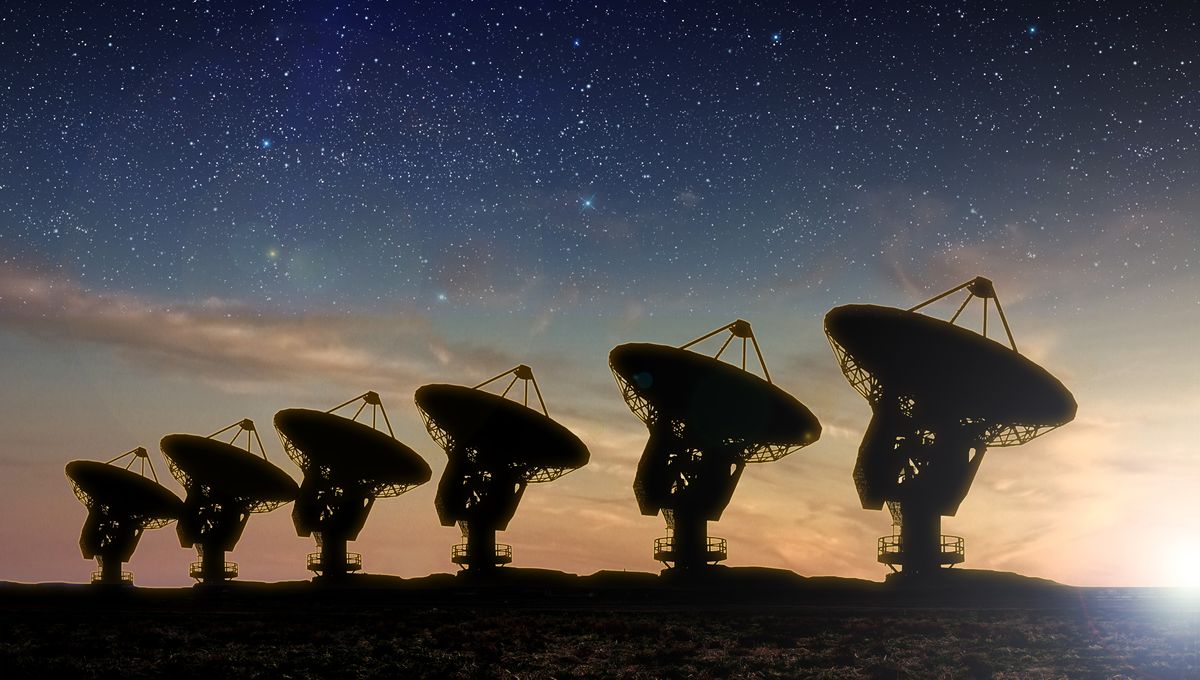
In the decades that humanity has actively looked for life beyond our planet, many have wondered how the initial contact between us and another intelligent civilization might take place. A new feature-length BBC drama-documentary, First Contact: An Alien Encounter, goes right to the heart of the matter, mixing interviews with world-leading experts and clever fictional scenarios (news programs, podcasts) exploring how discovering a signal from outer space may play out.
The premise is a signal is detected in the direction of the Voyager 1 probe, which is currently traveling in interstellar space. The first assumption is the detection is a fault (it wouldn’t be the first time) but after multiple signals are received, the idea that a real signal is being received becomes widespread. The documentary reconstructs what scientists, organizations, the media, and ordinary people might do and say in the following 12 days.
“We’ve been following the extraordinary advances in our exploration of alien worlds over the last few decades, and also been intrigued with the thinking, organisations like SETI [Search for Extraterrestrial Intelligence] and the United Nations have put into the potential response to a first contact,” executive producer Andrew Cohen, Head of the Science Unit at BBC Studios Production, told IFLScience.
The documentary is informed by real-life strategies for first contact with an extraterrestrial civilization as well as speculative reactions from around the world. When it comes to the science, the source of inspiration for the “signal” is obvious (but we’ll just link to it because it’s a spoiler).
The format of the show, including fictional media coverage, is influenced by both classic documentaries and pop culture.
“Threads was a big touchstone for me (a BBC science department drama about nuclear war from the 1980s) as it uses a very heavily researched and factually accurate drama to tell a ‘what if’ story with a real emotional punch,” director Nic Stacey told IFLScience. “Also, the original 1938 War of the Worlds radio adaptation, with its fictionalised news reports was a very helpful early inspiration.”
Some influences were a little more recent. “The response to the pandemic also really informed the script – it offered so many examples of how society reacts to a huge and unexpected global event,” Stacey said. “The way information gets filtered and fractured through social media, the public outpouring of emotions, the opportunism…and the immense hard work and dedication required by thousands of scientists to interpret what’s really happening and try to work out what to do next.”
The search for life beyond Earth has a variety of approaches beyond those of SETI, which specifically looks for the existence of advanced civilizations. Life in the form of ancient bacteria may be hiding elsewhere in the Solar System, underneath the surface of Mars, or in the oceans of moons Europa and Enceladus. JWST is looking at the atmosphere of exoplanets to detect any telltale signs of biosignatures within them. But meeting other intelligent species from beyond our planet would be something else.
“Given our current level of development as a species it would seem highly likely that any other intelligent civilisation out there would be far more intelligent than us – they would have to be able to communicate effectively with us, to have achieved interstellar two-way communication. It is therefore likely that they have been around for longer than we have and have had more time to solve a number of puzzles that still perplex us,” Dr Louisa Preston, an astrobiologist from University College London who features in the documentary, told IFLScience.
“As such, I would ask them the biggest of our questions: Where did life come from?’. I would ask them how they came to exist; how did life arise on their world; in what environments did it form and how long after their world was created did life arise?”
As Preston points out, we still don’t know exactly how, where, and when life arose on Earth, or, for example, how chemistry became biology. Any hints they could give us would be much appreciated.
“Hopefully, this more advanced civilisation would have had time to figure out some of the answers and could help fill in the blanks in our own history. I might also ask them if they have created Star Trek-esque transporters, warp drive, and universal translators yet and if so, could we borrow them please.”
First Contact: An Alien Encounter can’t help us answer all that but it does give us insight into what such an unprecedented discovery may be like.
First Contact: An Alien Encounter airs in the UK on BBC Two on November 2 and in the US on PBS on January 4, 2023.
Source Link: Exclusive: Earth’s First Alien Signal Explored In New BBC Documentary